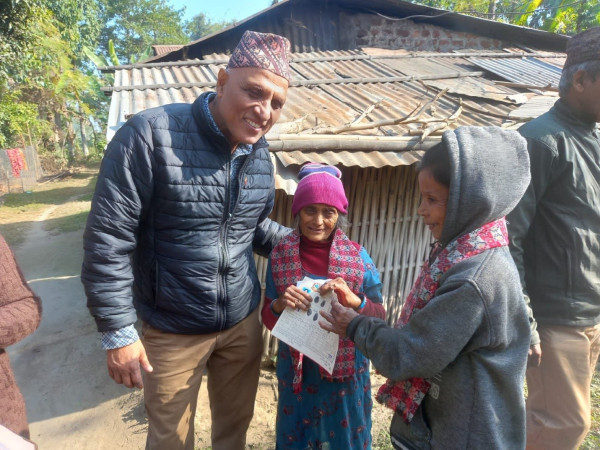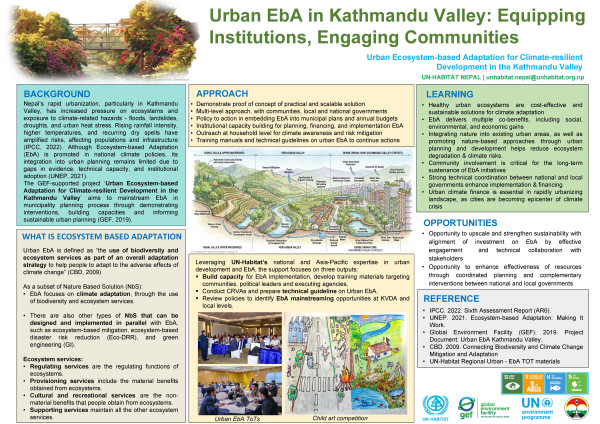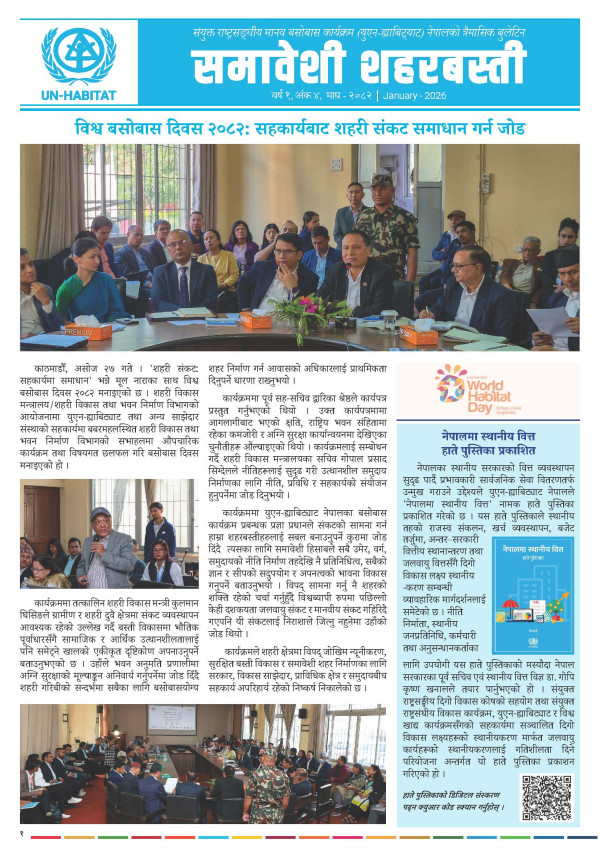Promoting the rights of indigenous persons - A Global Priority

Kankai Municipality, Nepal 26 April 2023-- Mana Maya Jogi,
belongs to one of the marginalised communities in Nepal. She has been living on
a plot of land of about 85 square metres in Ward 8 of Kankai Municipality,
inherited from her father, but without land certificates.
The history of the land dates to 35 years ago, when her grandfather
settled on an unregistered piece of land. With no land elsewhere and without
certificates for the land they had been residing in for several decades, she
was in constant fear of eviction.
Many promises by those in charge that they would get the certificates
for their parcels of land turned out to be hot air. Only this time, as the
process rolled out, they gained some confidence that they were on the path of
receiving the certificate. Now with the land ownership certificate in hand, she
expressed her happiness with no bounds “I finally feel I am a Nepali now, not
anymore, a second-class citizen of this country. The struggle was long, but it
was all worth the wait”.
Mana’s story, plus millions of others like her around the globe, is one
that will take centre stage at the current session of the Permanent Forum on
Indigenous Issues taking place in New York until 28 April. It is a key annual
event highlighting the importance of promoting and protecting the rights of
indigenous peoples world-wide. Many of the stakeholders agree that today, this
is not as important as ever.
In Nepal, UN-Habitat and the Global Land Tool Network have been working
with the national government and local municipalities to empower indigenous
persons and others subjected to long-standing exclusion to access land and
secure tenure. These measures provide some remedies to long-standing
inequalities and exploitation having left indigenous persons and others in
situations of poverty.
In communities that depend on agriculture as their most important form
of both food production and economic activity, having secure access to land is
an essential perquisite to achieve, or move towards achieving, an adequate
standard of living for individuals and their families. Even basic services such
as water supply, electricity and other public services may depend on land
ownership.
In Nepal, 60.4% of the population practices agriculture, yet 47.3% of
the rural population is landless or near landless, with the majority of land
having been held by limited elite groups. Historically, that meant that
especially indigenous persons, women, and others subjected to marginalisation
were unable to have secure access to land. This resulted in these groups being
at a high risk of finding themselves in exploitative situations of bonded
labour, where, in order to pay for basic household costs including paying for
medical care, tenants were required to take out loans from the landowner. They
were expected to pay these debts off with their Labour, but exorbitant interest
rates and additional exceptional costs could mean that the debt of a person is
passed on over generations.
Although this system was statutorily abolished 20 years ago, indigenous
communities still live in a vicious cycle of extreme poverty due to lack of
land tenure security that deprives them of basic services and accessing
economic opportunities.
UN-Habitat has been working in Nepal with the Global Land Tool Network
since 2016 to support the Government of Nepal and local municipalities in the
Identification, Verification and Recordation (IVR) of landless and informal
tenure-holders. Indigenous communities were key partners from the beginning
after having been marginalized for decades due to the deep-rooted feudal
system, with generations without formal land tenure documents.
As a result of this partnership, by the end of March 2023, in the 13
municipalities where UN-Habitat is affiliated, Municipalities within the
framework of National Land Commission have issued temporary cards to 74,226
households and land ownership certificates to 437 households. This is an
important first step to ensure that indigenous communities in Nepal can finally
access their land rights, which will impact their overall access to an adequate
standard of living and other related rights.
These and other matters are currently being discussed by indigenous
activists, Member States, UN partners, civil society, and others during the
twenty second session of the UN Permanent Forum on Indigenous Issues. Since its
first meeting in 2002, this Forum meets annually to provide expert advice and
recommendations on indigenous issues to the UN Economic and Social Council and
the United Nations overall, it raises awareness and promotes the integration
and coordination of activities related to indigenous issues within the UN
system, it prepares and disseminates information on indigenous issues and
finally promotes respect for and full application of the provisions of the UN
Declaration on the Rights of Indigenous Peoples.
More information is available here.
Source: https://unhabitat.org/news/26-apr-2023/promoting-the-rights-of-indigenous-persons-a-global-priority





